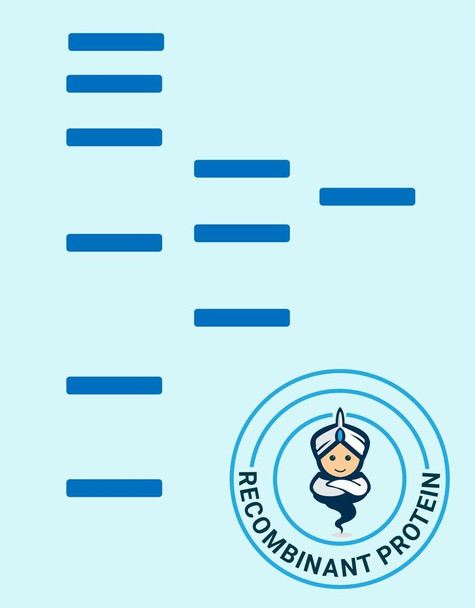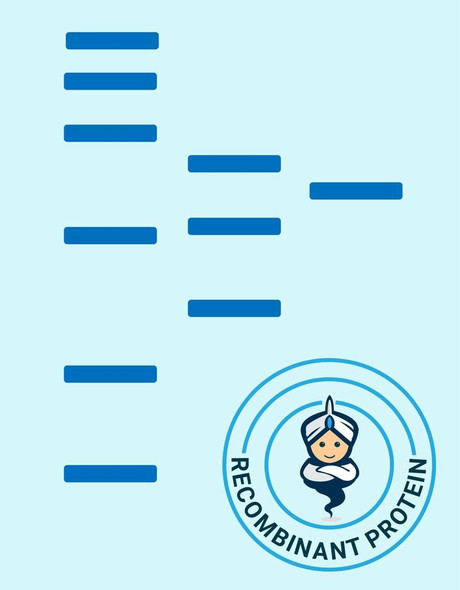Description
| Product Name: | Human MIP 4 Recombinant Protein |
| Product Code: | RPPB1228 |
| Size: | 10µg |
| Species: | Human |
| Target: | MIP 4 |
| Synonyms: | Small inducible cytokine A18, CCL18, Macrophage inflammatory protein 4, MIP-4, Pulmonary and activation-regulated chemokine, CC chemokine PARC, Alternative macrophage activation-associated CC chemokine 1, AMAC-1, Dendritic cell chemokine 1, DC-CK1, chemokine (C-C motif) ligand 18, CKb7, PARC, AMAC1, DCCK1, SCYA18. |
| Source: | Escherichia Coli |
| Physical Appearance: | Sterile Filtered White lyophilized (freeze-dried) powder. |
| Formulation: | MIP-4 protein is lyophilized from a 0.2�m filtered concentrated (1.0mg/ml) solution in 20mM PB, pH 7.4, 100mM NaCl. |
| Solubility: | It is recommended to reconstitute the lyophilized MIP-4 in sterile 18M-cm H2O not less than 100�g/ml, which can then be further diluted to other aqueous solutions. |
| Stability: | Lyophilized MIP-4 although stable at room temperature for 3 weeks, should be stored desiccated below -18°C. Upon reconstitution MIP-4 should be stored at 4°C between 2-7 days and for future use below -18°C. For long term storage it is recommended to add a carrier protein (0.1% HSA or BSA).Please prevent freeze-thaw cycles. |
| Purity: | Greater than 97.0% as determined by:(a) Analysis by RP-HPLC.(b) Analysis by SDS-PAGE. |
| Amino Acid Sequence: | The sequence of the first five N-terminal amino acids of MIP-4 was determined and found to be Ala-Gln-Val-Gly-Thr |
| Biological Activity: | The Activity MIP-4�is calculated by the ability to chemoattract Human T lymphocytes at 1-10ng/ml corresponding to a Specific Activity of 100,000-1,000,000IU/mg. |
Chemokine (C-C motif) ligand 18 (CCL18 / MIP-4) is a small cytokine belonging to the CC chemokine family that was previously called PARC (pulmonary and activation-regulated chemokine). MIP-4 is approximately 60% identical in amino acid sequence to CCL3. MIP-4 is expressed at high levels in lung and at lower levels in certain lymphoid tissues, such as the lymph nodes, and is chemotactic for activated T cells and non activated lymphocytes. The gene for human CCL18 contains three exons and is located on chromosome 17.
Macrophage Inflammatory Protein-4 Human Recombinant produced in E.Coli is a single, non-glycosylated, polypeptide chain containing 69 amino acids and having a molecular mass of 7813 Dalton. The MIP-4 is purified by proprietary chromatographic techniques.
| UniProt Protein Function: | CCL18: Chemotactic factor that attracts lymphocytes but not monocytes or granulocytes. May be involved in B-cell migration into B-cell follicles in lymph nodes. Attracts naive T-lymphocytes toward dendritic cells and activated macrophages in lymph nodes, has chemotactic activity for naive T-cells, CD4+ and CD8+ T-cells and thus may play a role in both humoral and cell-mediated immunity responses. Belongs to the intercrine beta (chemokine CC) family. |
| UniProt Protein Details: | Protein type:Secreted, signal peptide; Secreted; Motility/polarity/chemotaxis; Chemokine Chromosomal Location of Human Ortholog: 17q12 Cellular Component: extracellular space Molecular Function:protein binding; chemokine activity Biological Process: cell-cell signaling; response to biotic stimulus; cell communication; immune response; signal transduction; inflammatory response; chemotaxis |
| NCBI Summary: | This antimicrobial gene is one of several Cys-Cys (CC) cytokine genes clustered on the q arm of chromosome 17. Cytokines are a family of secreted proteins involved in immunoregulatory and inflammatory processes. The CC cytokines are proteins characterized by two adjacent cysteines. The cytokine encoded by this gene displays chemotactic activity for naive T cells, CD4+ and CD8+ T cells and nonactivated lymphocytes, but not for monocytes or granulocytes. This chemokine attracts naive T lymphocytes toward dendritic cells and activated macrophages in lymph nodes. It may play a role in both humoral and cell-mediated immunity responses. [provided by RefSeq, Sep 2014] |
| UniProt Code: | P55774 |
| NCBI GenInfo Identifier: | 2493666 |
| NCBI Gene ID: | 6362 |
| NCBI Accession: | P55774.1 |
| UniProt Secondary Accession: | P55774,Q53X71, B5BUM2, |
| UniProt Related Accession: | P55774 |
| Molecular Weight: | 9,849 Da |
| NCBI Full Name: | C-C motif chemokine 18 |
| NCBI Synonym Full Names: | chemokine (C-C motif) ligand 18 (pulmonary and activation-regulated) |
| NCBI Official Symbol: | CCL18�� |
| NCBI Official Synonym Symbols: | CKb7; PARC; AMAC1; DCCK1; MIP-4; AMAC-1; DC-CK1; SCYA18�� |
| NCBI Protein Information: | C-C motif chemokine 18; CC chemokine PARC; CC chemokine ligand 18; chemokine (C-C), dendritic; dendritic cell chemokine 1; small inducible cytokine A18; small-inducible cytokine A18; macrophage inflammatory protein 4; pulmonary and activation-regulated chemokine; alternative macrophage activation-associated CC chemokine 1; small inducible cytokine subfamily A (Cys-Cys), member 18, pulmonary and activation-regulated |
| UniProt Protein Name: | C-C motif chemokine 18 |
| UniProt Synonym Protein Names: | Alternative macrophage activation-associated CC chemokine 1; AMAC-1; CC chemokine PARC; Dendritic cell chemokine 1; DC-CK1; Macrophage inflammatory protein 4; MIP-4; Pulmonary and activation-regulated chemokine; Small-inducible cytokine A18Cleaved into the following 3 chains:CCL18(1-68); CCL18(3-69); CCL18(4-69) |
| Protein Family: | C-C motif chemokine |
| UniProt Gene Name: | CCL18�� |
| UniProt Entry Name: | CCL18_HUMAN |










